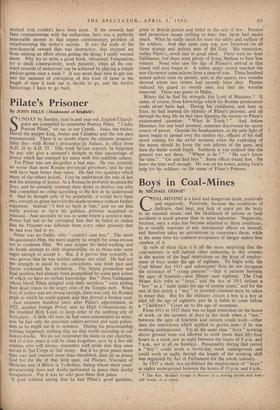Pilate's Prisoner
By JOHN HILLS ( Headmaster of Bradfield ) SUNDAY by Sunday, year in and year out, English Church- goers are compelled to remember Pontius Pilate. " Under Pontius Pilate," we say in our Creeds. Judas the traitor, Herod the puppet king, Annas and Caiaphas and the rest pass unmentioned. There is no doubt where the ultimate responsi- bility lies—with Rome's procurator in Judaea, in office from A.D. 26 to A.D. 35. This Week he can scarcely be forgotten by any who give a moment's thought to that miscarriage of justice which has stamped his name with this indelible infamy. Yet Pilate was not altogether a bad man. He was certainly no worse than most Roman proyincial governors,' and he may well have been better than many. He had two qualities which many of the others lacked, First he understood the rule of law and the meaning of justice, As a Roman he probably despiSed the' Jews, and he certainly resented their desire to destroy one who had committed no crime according to the law as he understood it. Had he thought only of his popularity, it would have been easy enough to grant leave for the death-sentence without further argument.. Instead " I find no fault in him," and we see him really anxious to have his guiltless prisoner acquitted or released. And secondly he was to some extent a sensitive man. Power had not so far corrupted him that he failed to realise that his Prisqner was different from every other prisoner that • ,. he had ever had to try.
Pilate was no Gallio, who " couldn't care less." The more he questioned Him, the more eagerly he sought for some excuse not to condemn Him. We may despise his hand-washing and its feeble attempt to shift responsibility on to those who were eager enough to accept it. But, if it proves him cowardly, it also proves that he was neither callous . nor cruel. Be had not the strength to stand by his convictions, and both past and future weakened his resolution. The future promotion and final position had already been jeopardised by some past action of which we have no certain knowledge. But ' those Galilaeans whose blood Pilate mingled with their sacrifices " were adding their dead voices to the angry cries of the Temple mob. When love of justice was not strong enough, there was only his Roman pride to whith he could appeal, and that proved a broken reed.
Just nineteen hundred years after Pilate's appointment; in 1925, another foreign Power sent its High Commissioner to the troubled Holy Land, to keep order in the seething city of Jerusalem. A little old man, he had once commanded an army; now he had only his unarmed soldier-servant and such police- men as he might see, fit to summon. During his proconsulship nothing happened, nothing that we find worth recording in our history-books. We do not remember his name in our churches, and in a few years it will be clean forgotten, save by 'a few old soldiers who will always remember with pride that they once served in 2nd Corps or 2nd Army. But if we prize peace more than war, and concord more than bloodshed, then let us praise God for the life of that little man, old Plumer, Viscount of Messines and of Bilton in Yorkshire, during whose three years' governorship Jews and Arabs .performed in peace their lawful occupations. For it was he who gave 'them that rtace. It goeg without saying that he had Pilate's good' qualities, pride in British justice and belief in the rule of law. Pension and promotion meant nothing to him; they never had meant much. What he really cared for were the safety and welfare of his soldiers. And that same care was now bestowed on all those strange and jealous men of the East. His reputation. unlike Pilate's, stood him in good stead. There were no dead Galilaeans, but there were plenty of living, Maltese to bear him witness. None who saw the day of Plumer's arrival in that island will ever forget it. A sullen, angry crowd watched the new Governor come ashore from a man-of-war. Three hundred armed sailors were On parade, and,' in the square, two wreaths showed where two rioters had recently been shot. Plumer reduced his guard to twenty men and had the wreaths removed. There was peace in Malta. Where did he find his strength; this Lord of Messines ? It came, of course, from knowledge which his Roman predecessor could never have had. During his childhood, and later at Eton, he had learned the identity of Pilate's prisoner, and all through his long life he had been learning the answer to Pilate's unanswered question: " What is Truth " And before Messines, for one brief moment, someone discovered- his secret source of power. Outside his headquarters, as the pale light Of dawn began to spread over the eastern sky, officers of his staff stood waiting for the awful moment when the exploding of the mines should let loose the vast inferno of the guns, and then the battle would begin. Suddenly it w, as realised that the general was not there. " Where is he ? " " He can't know the time." " Go and find him." Some officer found him. • He knew the time well enough. He was on his knees, asking God's help for his soldiers—in the name of. Pilate's Prisoner.


































 Previous page
Previous page